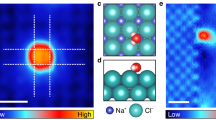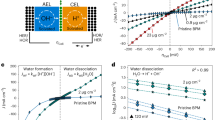Abstract
WHEN a solid metal is dipped into a polar electrolyte, a spontaneous transient pulse of net current, carried across the interface by metal ions, generates a potential difference ΔV between the solid and the bulk of the liquid. It is then either offset by an opposite electron current (gas evolution) or, if the bulk of the electrolyte contains some concentration cm(∞) of the metal ions to begin with, the familiar dissolution-deposition equilibrium supported by ΔV (which is calculated from cm(∞) according to Nernst1) may be established across the interface.
This is a preview of subscription content, access via your institution
Access options
Subscribe to this journal
Receive 51 print issues and online access
$199.00 per year
only $3.90 per issue
Buy this article
- Purchase on Springer Link
- Instant access to full article PDF
Prices may be subject to local taxes which are calculated during checkout
Similar content being viewed by others
References
Nernst, W., Z. phys. Chem., 4, 129 (1889).
Gurney, R. W., Ions in Solution (Cambridge, 1936).
Debye, P., Polar Molecules (Chemical Catalog Co., New York, 1929).
Debye, P., Ann. Physik., 39, 789 (1912).
Author information
Authors and Affiliations
Rights and permissions
About this article
Cite this article
BASS, L. Spontaneous Dissolution of Metals in Polar Electrolytes. Nature 198, 982–983 (1963). https://doi.org/10.1038/198982a0
Issue Date:
DOI: https://doi.org/10.1038/198982a0
This article is cited by
-
Kinetics of external dissolution of metals in metallic melts. (Review)
Soviet Powder Metallurgy and Metal Ceramics (1970)
-
Interaction of Alkali Earth Metals with Water
Nature (1964)
-
Exchange Currents at Liquid Electrodes
Nature (1963)
Comments
By submitting a comment you agree to abide by our Terms and Community Guidelines. If you find something abusive or that does not comply with our terms or guidelines please flag it as inappropriate.



